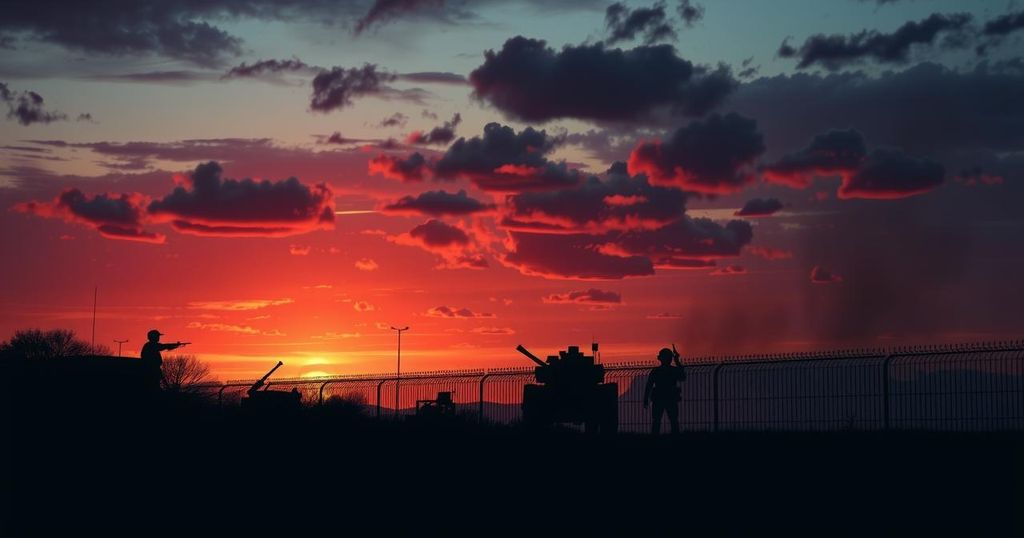Israel’s outgoing military chief, Lt. Gen. Herzi Halevi, warned of potential threats posed by Egypt’s expanding military capabilities despite a longstanding peace treaty. His comments reflect concerns over Egypt’s advanced military assets, signaling a need for heightened vigilance. The current security cooperation between Israel and Egypt continues, but rising tensions and military enhancements in Egypt are raising alarms regarding future stability in the region.
Israel’s outgoing military head, Lt. Gen. Herzi Halevi, has expressed concerns regarding Egypt’s expanding military capabilities, suggesting they could present an unforeseen threat in the future despite the longstanding peace treaty between the nations. Speaking to officer graduates in Holon, he indicated that while Egypt does not currently pose a direct danger, the situation could shift unexpectedly due to Cairo’s advancements in military technology, such as advanced jets and submarines.
Halevi highlighted that Egypt possesses a large army equipped with sophisticated weaponry and warned that such military capabilities might alter the security landscape at any moment. He referenced Egypt’s historical context, pointing out that leadership changes, like the rise of Mohamed Morsi, have previously transformed the military’s focus and alignment.
His comments come amid heightened tensions between Israel and Egypt. Last month, Israeli Ambassador to the United States, Yechiel Leiter, condemned Egypt’s military buildup and described it as a serious infraction of their peace agreement, emphasizing the construction of bases potentially intended for offensive military operations.
Mariam Wahba, a defense analyst, shared insights that indicate Egypt’s military maneuvers exceed the limitations imposed by the Camp David Accords, allowing only 47 battalions. Reports suggest that there may be camps for as many as 180 battalions, raising alarms regarding a potential breakdown of the peace accord that has historically stabilized the region.
Israeli Ambassador to the UN, Danny Danon, also voiced concerns about Egypt’s acquisition of advanced military hardware, questioning the necessity of such preparations given the current lack of threats on their borders. He noted that the events of October 7 have reaffirmed the need for vigilance regarding Egypt’s military activities.
In response to these anxieties, Egyptian Ambassador to the UN, Osama Abdel Khalek, defended Egypt’s military strategies, clarifying that their military enhancements are defensive measures essential for national security and regional stability. Despite rising tensions, Israeli defense channels reportedly maintain strong security coordination with Egypt, aimed at mutual interests.
Nevertheless, Egypt’s military enhancements, particularly in the Sinai, provoke concern in Israel, especially with regards to the Philadelphi Corridor along the Gaza border. Egypt’s military growth is seen partly as a reaction to Israeli presence in this area and aims to prevent a potential Palestinian exodus.
Egypt has rebuffed proposals, including one by former President Trump, that would have transferred governance of Gaza to it while managing reconstruction. Egypt continues to advocate for a two-state solution in the Israeli-Palestinian conflict, underscoring its aspirations for Palestinian self-determination alongside Israeli security.
Recent statements from Egypt reiterate its stance against taking responsibility for governing Gaza post-conflict, dismissing suggestions from Israeli opposition figures proposing administrative control in exchange for economic concessions. Thus, diplomatic and military watchfulness remains crucial in the ongoing dynamics between Israel and Egypt.
In summary, Lt. Gen. Herzi Halevi’s remarks highlight Israel’s apprehensions concerning Egypt’s evolving military capabilities amid rising tensions. While Egypt is not deemed an immediate threat, the potential for change in its military posture reflects broader regional concerns. Mutual security interests continue to shape the relationship; nonetheless, ongoing developments necessitate vigilant monitoring from Israel. The peace treaty remains a critical framework for stability in the region, although its integrity is challenged by Egypt’s military developments and geopolitical dynamics.
Original Source: www.algemeiner.com






